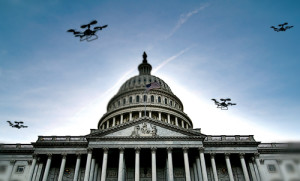
As previously reported in DRONELIFE, several industry groups and companies have already expressed support in the formation of a proposed rulemaking task force, including Precisionhawk and the Association for Unmanned Vehicle Systems International.
Some, like Measure CEO Brandon Torres Declet see the move as an effort to “increase accountability and discourage bad behavior among drone users.” “Too many newcomers to the industry have ignored the rules and put aircraft in the national airspace at risk, while commercial drone service providers have made the effort to work with the FAA,” Declet said in a statement to NBC.
Other industry leaders remain skeptical. “As with all things, the devil is in the detail,” Michael Drobac, director of the Small UAV Coalition told Bloomberg. “We have very little detail and much of this feels like it’s being pulled together very rapidly and with very little input from industry.”
Noted legal drone expert and current DJI vice president for policy and legal affairs Brendan Shulman agreed that the details will dictate how smoothly the new registry system will fly.
“The feasibility and effectiveness of any drone registration system will very much depend on the details of how registration would be accomplished, who would manage the process, and which types of drones it would apply to,” Shulman said in a media statement.
Aviation attorney Jonathan Rupprecht sees several potential problems with the federal plan, detailing at least 11 problems with registration. “How in the world is drone registration going to stop, actually prevent, the incident/crime/accident?” Rupprecht asks in his column.
“The two main groups that are causing problems are the “how high can it fly” group and the “I will fly wherever I want” group. Both of these groups can be countered with geo-fencing far better than registration. Registration points you to who might have caused the incident, geo-fencing can help prevent it,” he added.
The attorney also question how the DOT or FAA would have any jurisdiction or authority to require drone registration when the vehicles are on the ground, not being flown, with the drone being turned off, in a box, and inside a building … Buying a drone from a store is not operating a drone. Once the drone leaves the ground outside, then the FAA can argue jurisdiction.
Jason is a longstanding contributor to DroneLife with an avid interest in all things tech. He focuses on anti-drone technologies and the public safety sector; police, fire, and search and rescue.
Beginning his career as a journalist in 1996, Jason has since written and edited thousands of engaging news articles, blog posts, press releases and online content.
Email Jason
TWITTER:@JasonPReagan
Subscribe to DroneLife here.